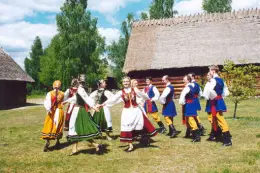On Nov 24 2012, David Shulist received one of the most prestigious prizes that can be awarded to anyone in Kashubia. This is the Stolem Medal award. Stolem is the Kashubian term for giant. David was awarded the prize in Gdunsk, which is the capital city of Kashubia. This was in recognition of his work and his role in helping to preserve, develop and create awareness about the Kashubian language. The award was presented by the Pomerania Student Organization, from the University of Gdunsk. The award has given out every year since 1967. Some of the projects that Davis started included a radio show, the annual Kashub day festival, Kashub Griffins hockey, Kashub embroidery classes in elementary school and the website kashub.com.
There are about 200,000 people who speak Kashubian. Out of this, 53,000 people speak it as a day to day language. Most Kashubian speakers can be found in central Poland and also in Canada. Currently, there are a number of schools where children are taught Kashubian. There are also a number of books, magazines, TV programs and radio shows that use Kashubian. Until recently, most linguists grouped Kashubian as a Polish dialect. On 6th January 2005, the Polish government passed a Minorities and Language law, which recognized Kashubian as a language on its own. Kashubian emerged in the 14th century. The language was first documented by Dr. Alexander Majkowski during the early 20th century. Even though their was long term contact between the Kashubian language and Polish, there is a clear difference between the 2 languages. This lies in the vocabulary, phonetics and the formation of words.
Kashubian is a minority language in Poland. It used to be spoken in Germany, but it is no longer used there. Kashubian is mainly used as a home language, as parents use it with their children and grandchildren. Various factors have led to the weakening of the language in Poland. This includes the fact that there are so many other languages spoken in the country and the lack of a standard language. By learning Kashubian, you will be able to pronounce more of the Anglo Saxon vowels, a, e, o, u correctly, more than the Polish can.
